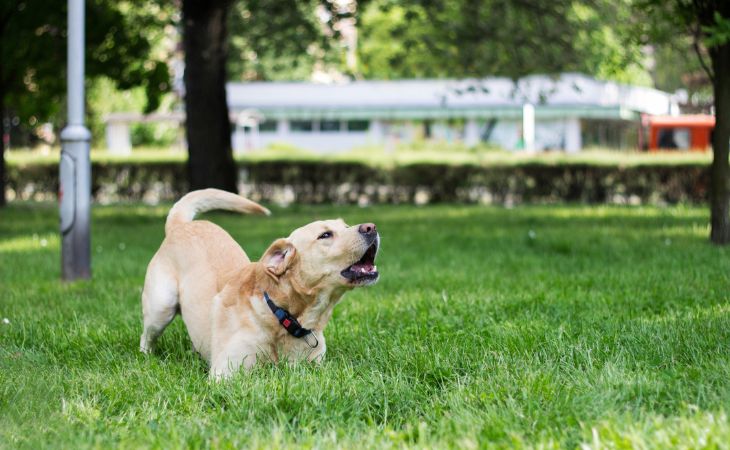At any hour during the day or night, dogs can express their emotions through their bark. It’s by these sounds that they’re able to communicate how they feel to their owners. They also usually accompany these sounds with body language. In this article, we’ll explain why dogs bark, identify which situations cause dogs to bark, and share a few tips to prevent your dog from barking excessively.
Barking: a completely normal behavior
Whether they are happy, sad, or scared—it is natural for dogs to express how they are feeling through barking. With that being said, some dogs communicate through barking much less than others. For example, some dogs rarely bark, while others howl when a siren sounds.
Barking remains the main way for dogs to communicate. It’s sometimes very “contagious”. For example, when a dog starts to bark, dogs nearby are quick to start barking themselves. Barking is considered a sort of reflex for these animals.
Dogs can bark to get their way
It doesn’t take long before dogs start to use their bark to get their owner to do what they want. For example, many dogs linger around the table and bark at the top of their lungs until someone gives them something to eat. For dogs who have made a habit of this, this situation can happen often. If dogs know that barking will get them a reward, they will continue to do so day after day.
Similarly, dogs bark to make strangers get off their territory. Whether it be passing humans or animals, if they run away every time that they bark, they will continue to do this.
Dogs can bark when something’s wrong
A dog’s bark isn’t without reason. For example, it can hide a discomfort or an uncomfortable situation that your dog has found themselves in. If they notice something threatening, they quickly alert those close to them by barking loudly.
Dogs can also bark when their owner is not there. While some wait patiently in silence, others can’t prevent themselves from howling. These barks are caused by feelings of solitude that are weighing on them.
Dogs can bark when playing
Often, we notice that dogs bark when they are having fun. When their owner chases after them or has a ball in their hands, dogs often put themselves in a “hunting” position, ready to sprint. Then, they let out little barks. They are simply excited to play. This is very normal. Playing is a great way for dogs to let off steam and express their joy through barking.

How do I deal with excessive barking?
After recognizing when your dog barks, it’s possible to target their triggers and prevent excessive barking.
Don’t give in to excessive barking
Your dog’s behavior can change if you and those around you be firm without giving in. For example, it’s important to not give in when your dog barks at the table or only to attract your attention. If your dog has barked like this for years already, they might still continue to bark. It’s important to be patient and continue to stay firm.
The goal is make your dog understand that barking to obtain something doesn’t work anymore. It is best to wait before giving them attention. Once they are calm and have stopped barking on their own, you can give your dog attention.
Prevent barking when you’re not home
Most dogs are not used to being alone for long periods of time. When this happens, their impatience is expressed through howling and barking.
To prevent this, you should train your dog to spend time alone when they are still young. As they get older, they will adapt and understand that their owner will come back soon. They will ultimately have an easier time dealing with the absence—whether it be for a few minutes or the entire day.
You can plan an intense playing session before leaving to tire out your dog for a while. Leave them what they need to occupy and amuse themselves while you’re not there. This’ll allow them to have a more pleasant time waiting and forget the stress of the departure.
Punishing your dog when their barks come from fear or stress is not a good solution—on the contrary! Instead, playing and spending time with your dog before leaving can prevent their anxiety. In addition, some toys are made to reduce stress in dogs. They are made from materials that help to soothe the animal. You can consider giving these types of toys to your dog.
Stop your dog from barking at strangers
Does your dog bark at strangers when they walk past the window? If they see that strangers move after they bark, they could think that it’s thanks to their bark. To prevent these types of situations, you can hide the view of the exterior from your dog with curtains.
Dogs just want to protect their territory from intruders and take this role very seriously. If you are close with your neighbors, you can present your neighbors to your dog. By doing this, they will later recognize them when they pass by and will no longer feel stressed. While they’ll still sometimes bark to greet these now-familiar faces, they’ll no longer do so systematically.
Recognizing an abnormal bark
When your dog barks in an unusual way, it should be taken seriously. Dogs can suffer on the inside without showing any particular physical signs. The same is to be said of older dogs that can become senile and bark in the middle of the night. A vet’s opinion is always advised in cases like this.
Barking is anchored in a dog’s genes. This is how they communicate. While shepherds and farmers don’t need to keep their dogs quiet as much, it’s difficult to deal with excessively barking in more restricted urban areas.
Long term positive training to calm excessive barking is the best solution. Recognizing and helping your dog blossom in your home by imposing rules for their safety is key. Your dog will feel at ease and not want to bark uselessly.

